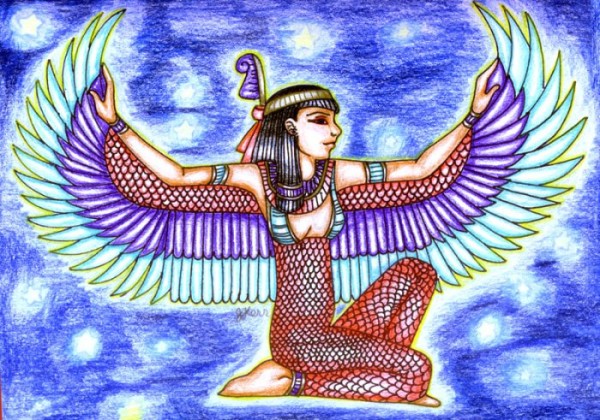Cross posted @ God Is 4 Suckers!
 I have long maintained that the Old Testament (and by extension, the Talmud/Torah) are a compilation of borrowed myths and stories as the Israelites moved from one culture to another.
I have long maintained that the Old Testament (and by extension, the Talmud/Torah) are a compilation of borrowed myths and stories as the Israelites moved from one culture to another.
To be honest, though, I much prefer the Greek and Egyptian mythologies. Their deities tend to be richer (or darker) in character, more interesting by far than the drab micro-managing psychopathic one-note weirdo named YHVH.
And those Egyptians! Whew! While the Greek godset was content to be changing back and forth from animals (or varied other shapes) to their original humanoid forms, the Egyptian godset were patchwork creatures both animal and human.
One such was Ma'at:
Ma'at, to have been pronounced as *Muʔʕat (Muh-aht), was the Ancient Egyptian concept of order—law, morality, and justice which was deified as a goddess. Ma'at was seen as being charged with regulating the stars, seasons, and the actions of both mortals and the deities, after she had set the order of the universe from chaos at the moment of creation.
Later, as a goddess in other traditions of the Egyptian pantheon, where most goddesses were paired with a male aspect, her masculine counterpart was Thoth and their attributes are the same.Like Thoth, she was seen to represent the Logos of Plato. After the rise of Ra they were depicted as guiding his boat, one on either side.
After her role in creation and continuously preventing the universe from returning to chaos, her primary role in Egyptian mythology dealt with the weighing of souls that took place in the underworld, Duat. Her feather was the measure that determined whether the souls (considered to reside in the heart) of the departed would reach the paradise of afterlife successfully.
(Snip)
In Duat, the Egyptian underworld, the hearts of the dead were said to be weighed against her single Shu feather, symbolically representing the concept of Ma'at, in the Hall of Two Truths. A heart which was unworthy was devoured by the goddess Ammit and its owner condemned to remain in Duat. The heart was considered the location of the soul by ancient Egyptians. Those people with good, (and pure), hearts were sent on to Aaru. Osiris came to be seen as the guardian of the gates of Aaru after he became part of the Egyptian pantheon and displaced Anubis in the Ogdoad tradition.
(End snip)
The ancient Egyptians had some weird aspects in their deities - Atum-Ra created himself, they had death gods galore (hearts and skulls, hmmm...), and trying to keep track of who was father/mother to whom becomes a chore best relegated to Egyptologists.
The reason I even bring this up, is the interesting 42 Negative Confessions:
-
1. I have not committed sin.
2. I have not committed robbery with violence.
3. I have not stolen.
4. I have not slain men or women
5. I have not stolen food.
6. I have not swindled offerings.
7. I have not stolen from God/Goddess.
8. I have not told lies.
9. I have not carried away food.
10. I have not cursed.
11. I have not closed my ears to truth
12. I have not committed adultery.
13. I have not made anyone cry.
14. I have not felt sorrow without reason
15. I have not assaulted anyone
16. I am not deceitful.
17. I have not stolen anyone’s land
18. I have not been an eavesdropper
19. I have not falsely accused anyone.
20. I have not been angry without reason.
21. I have not seduced anyone’s wife.
22. I have not polluted myself.
23. I have not terrorized anyone.
24. I have not disobeyed the Law.
25. I have not been exclusively angry.
26. I have not cursed God/Goddess.
27. I have not behaved with violence.
28. I have not caused disruption of peace.
29. I have not acted hastily or without thought.
30. I have not overstepped my boundaries of concern.
31. I have not exaggerated my words when speaking.
32. I have not worked evil.
33. I have not used evil thoughts, words or deeds.
34. I have not polluted the water
35. I have not spoken angrily or arrogantly.
36. I have not cursed anyone in thought, word or deeds.
37. I have not placed myself on a Pedestal.
38. I have not stolen what belongs to God/Goddess.
39. I have not stolen from or disrespected the deceased.
40. I have not taken food from a child.
41. I have not acted with insolence.
42. I have not destroyed property belonging to God/Goddess.
My point being, is that many of these seem...eerily familiar. Or is it just me?
(The one about 'not eating my own heart' is just weird, but then, it probably has some esoteric meaning that escapes me.)
So, when the Hyksos were forcibly evicted from Egypt (obviously the only real 'exodus' that occurred), they obviously borrowed the minimalist version that suited their nomadic lifestyle.
Obviously, they didn't much appreciate the hybridization concept the Egyptians bestowed on their make-believe friends.
Along with the obvious issues that Judaism has always had with the opposite gender, I might add.
This has been the Apostate, reporting from the dust bins of history, signing off.














2 comments:
14. I have not felt sorrow without reason...
20. I have not been angry without reason...
Huh?
How about, I have not skipped my daily dose of Prozac?
I've never seen that list before. Thanks for posting it. I think that's better than the ten commandments since it's more specific about appropriate behaviours and attitudes and it would make me proud to check off all the things I haven't done. I'd feel good about myself everyday, with a list like this.
Post a Comment